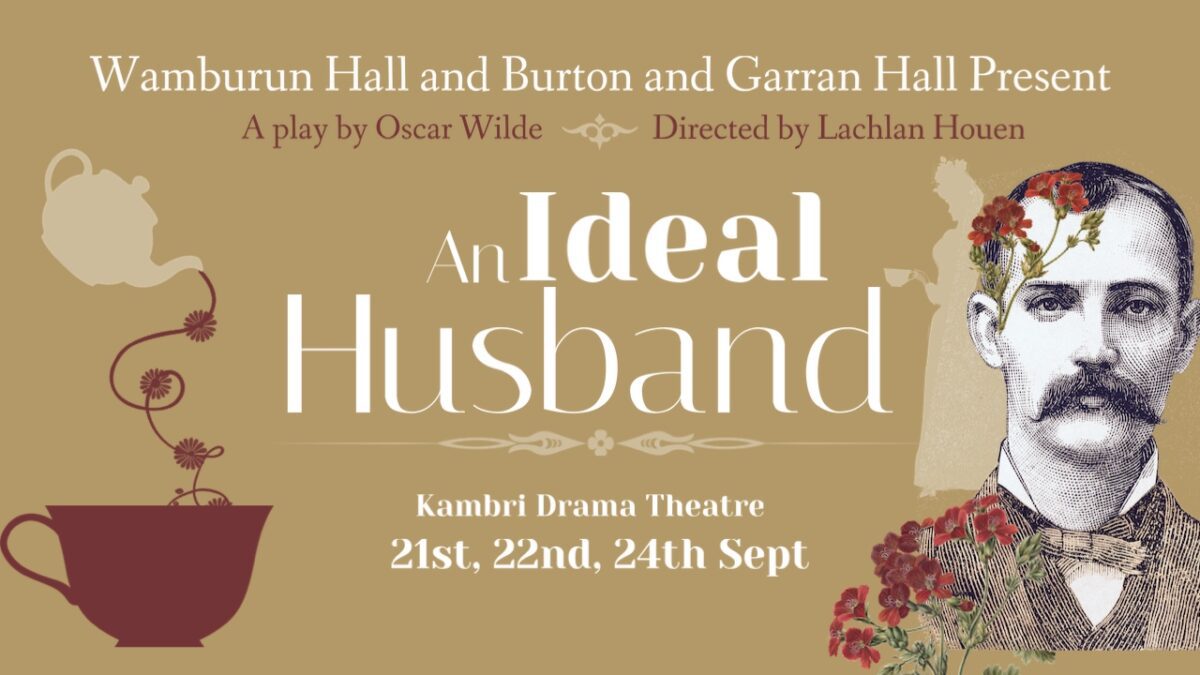In going to see Wamburun and B&G’s production of an Oscar Wilde play there were a few things I expected to see. London High Society with all the flouncing, sulking, and pettiness that goes with it – check; a sardonic, witty bachelor dismissive of the rules of that society – check; using that bachelor to have a riot of a time poking fun at said London High Society – check. So far, so good. What I didn’t expect was the play’s villainous mastermind Mrs. Cheveley (Freya Brown) bathed in red light, cackling like a third-rate Bond villain (in the best way), while that one song from the Phantom Menace crescendos in the background…
So, not an entirely traditional adaptation then.
Perhaps the best way to describe this rendition of An Ideal Husband is as a production with all the dials set to ten (or eleven, or twelve). The cast’s posh-ish British-ish accents perfectly set the tone for a play that seems utterly incapable of approaching anything earnestly, and I love it. Chloe Tyrell’s physical comedy as Lord Cavesham steals every scene she’s in, and watching Sir Robert Chiltern (Oscar Mikic) winge, mope, and occasionally-chug-a-whole-can-of-seltzer-mid-scene his way into a position as a British cabinet minister is a joy. In a memorable scene, the play’s flamboyant bachelor Lord Arthur Goring (a perfectly ridiculous performance by de Mars) tells his father that, by order of his doctor, he is only serious on the first Tuesday of each month, between noon and three. I saw it late on a Saturday and am happy to attest that nothing remotely serious enough to concern Lord Goring’s doctor occured.
However, to deny the play’s seriousness is not to doubt its cleverness. The modest set of a few pieces of furniture and two free-standing doors is dressed well enough to sell the late 19th century, yet flexible enough to configure itself into the different houses where the play takes place. What sexism there is in the play is elegantly submerged in so many layers of ridicule and pomp that it doesn’t feel too jarring, and the lighting by Josh Abeler and Colin Loh is also a rousing success. Particularly the use, and then reuse, of spotlights to give a sense of Robert Chiltern’s egotism and to point out the gay subplot between him and Lord Goring which, given this is Oscar Wilde, is sometimes more text than subtext.
It is worth mentioning that, compared with other student theatre productions, An Ideal Husband is distinctly less professional. There were line stumbles, technical difficulties, and lighting and scene transitions weren’t always frictionless; however, I found it very hard to care. A different audience’s mileage may vary, but I found these little slip-ups deeply humanising. Each ad-libbed line to cover a dropped prop was a peak behind the curtain – which might have been a problem had what we saw behind it not been so much fun. In his Director’s Notes, Lachlan Houen places the enjoyment of the cast and crew on an equal level with the enjoyment of the audience, and that priority shows. Wamba and B&G’s production is unabashedly student theatre – and is as much for the students performing the work as those in the audience; but when everyone in the room is having as much fun as was had on Saturday night, I can’t call it anything other than a complete success.
We acknowledge the Ngunnawal and Ngambri people, who are the Traditional Custodians of the land on which Woroni, Woroni Radio and Woroni TV are created, edited, published, printed and distributed. We pay our respects to Elders past and present. We acknowledge that the name Woroni was taken from the Wadi Wadi Nation without permission, and we are striving to do better for future reconciliation.
